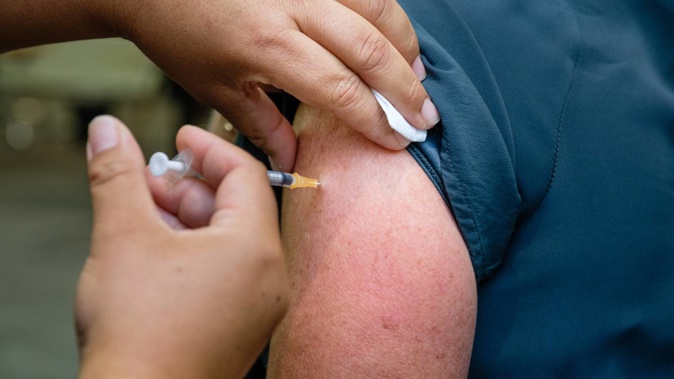
Public health experts say widening Covid and flu vaccine access is one key tool to meeting the Health Minister's emergency department target - which has never before been reached.
It comes as health officials warn extra investment may be needed to achieve 95 percent of people admitted, discharged or transferred from ED within six hours.
According to information released to Newstalk ZB, officials advised that target was "unlikely to be safely achieved by 2027."
That’s just three year’s prior to the 2030 target Cabinet agreed to, as announced by Health Minister Shane Reti in March.
The most recent data, from January - March this year, shows just under 70 percent of patients were through New Zealand emergency departments within six hours.
Officials warned Reti the target had never been met nation-wide and would require a "whole of system approach" - identifying influenza and Covid vaccination coverage, early supported discharge and stable access to Aged Care as solutions.
But experts say a change in flu vaccine eligibility could already be setting this target on the wrong track.
Six-month to 12-year-old children and Māori and Pacific people aged 55 to 64 years old were eligible for a funded influenza vaccine in 2023, but are not eligible in 2024, unless they have other medical conditions.
New Zealand Royal College of General Practitioner's Medical Director Dr Luke Bradford said this change will "absolutely" make it more difficult to reduce ED wait times.
"We know disproportionately that children, especially children with respiratory illnesses show up in ED and we know that Māori and Pasifika are over-represented in ED, and more likely to have complications from things like Covid and flu, so changing the age eligibility upwards was a backwards step."
Otago University's Michael Baker agreed it's a missed opportunity, and also argued Covid booster vaccines should be free and available to everyone of working age; currently it is available from age 30.
"Influenza causes around 500 deaths a year and over 2,500 hospitalisations ... and with Covid we're looking at 1000 deaths this year and 10,000 hospitalisations,” Baker said.
"These are having a big effect not just on individuals involved and their families, but also on the whole healthcare system - so there's a lot of opportunities there to do better on prevention."
"It is just using the data we've got intelligently to really tackle this problem of avoidable presentations at hospitals - I think it's really a winnable issue and we would all benefit."
He said widening vaccine access should be part of a plan to reduce avoidable hospitalisations, along with other opportunities like reforming alcohol laws and retaining lower speed limits.
The eligibility criteria for funded influenza vaccinations, which changed this year, is set by Pharmac.
The drug funding agency said in February it had widened vaccine access in 2022 and 2023 as part of the Government’s response to Covid-19, using the ring-fenced COVID-19 treatment budget.
It said eligibility is targeted to those at the highest risk of becoming ill, and had been determined through clinical advice sought from its Immunisation Advisory Committee.
Reti he agreed vaccination coverage is one of the best tools to reduce hospitalisations, and is part of his health strategy - though he says he's comfortable with current Covid eligibility criteria.
"That's not the information I've been given from Health New Zealand at the moment, they're happy with the criteria and I haven't seen anything that would change that at this point."
Health New Zealand Chief Clinical Officer Dr Richard Sullivan said improving uptake among people eligible for Covid and flu vaccines is also important, before access is widened.
"It's one thing to provide access and another to make sure you actually immunise your population. So that's one of our health targets, to try and get up to 95 percent of our population immunised ... so a real focus on those who have access to immunisations."
"We see that as a really important first step before we look at widening access further."
He said preventable hospitalisations have increased over the past few years - and while vaccination is part of that, it's not the whole picture.
"We are seeing those rates go up a little, and so trying to understand the different opportunities we have for those populations and how we could reduce that .
"How much of that we can attribute to vaccination versus some of the challenges we have in our community in terms of access to primary care ... it's probably a mixture of all of that."
Sullivan said he expected there would be progress on ED targets with the next year.
Data from Health NZ shows the cumulative total of Covid-19 vaccinations was more than 1.1 million higher as at July 21 this year, compared to the same period last year.
However there were more than 90,000 fewer influenza vaccinations over the same period this year, compared to 2023.
Reti acknowledged it was a "harder environment" to meet targets around vaccination and ED stays.
"Fair to say it will be hard, because if we look at international data it's hard all around the world. Since Covid there's been an increase in vaccine hesitancy and we've seen that here in New Zealand."
He said efforts underway to boost vaccination included increasing the number of vaccinators - such as through extra funding for Hauora Māori, and allowing pharmacies to provide vaccines - and a recent public awareness campaign throughout Winter.
He says the Government will set out milestones for its health targets by the end of the year.
Take your Radio, Podcasts and Music with you









